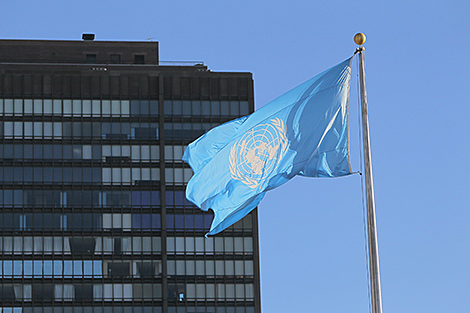Events
Another UN Human Rights Council resolution slammed as anti-Belarusian

MINSK, 13 July (BelTA) – Belarus’ honest stance on international problems and the rejection of the hypocritical interpretation of international obligations concerning human rights irritates the West. The statement was made by the Permanent Mission of the Republic of Belarus to the United Nations Office and other international organizations in Geneva after the UN Human Rights Council passed another resolution of the European Union and the United States of America on 13 July to describe the state of affairs with regard to human rights in Belarus and after the mandate of the special rapporteur on human rights in Belarus was extended by a year, BelTA has learned.
In her speech during the 53rd session of the UN Human Rights Council Permanent Representative of the Republic of Belarus to the United Nations Office at Geneva Larisa Belskaya noted that there is a group of countries that manipulate human rights mechanisms to advance their geopolitical interests, masking them with concern about human rights. For many years they have been putting pressure on Belarus through resolutions and mechanisms of the UN Human Rights Council.
“The real reason for this is not the situation with human rights in Belarus, which is on par and even better than that in certain Western states. The reason is Belarus’ geopolitical choice, Belarus’ honest stance on international problems and the rejection of the hypocritical interpretation of international obligations concerning human rights. The stance is inconvenient for Western governments,” the official stressed.
In her words, it is hypocritical to initiate such resolutions if the initiators apply different standards to their own problems concerning human rights. They are partially illustrated by the report released by the Belarusian Ministry of Foreign Affairs to describe the situation with human rights in Western countries. “No one is perfect, including Belarus. But the Belarusian state develops peacefully and improves conditions for all human rights. It is often done in spite of artificial barriers in the form of Western sanctions and attempts to artificially isolate my country in the international arena,” Larisa Belskaya said.
She is convinced that the West is channeling UN resources into country mechanisms in order to drive a wedge between the state and the people, to oppose state institutions to certain “civil society structures” that live off Western grants and lobby for the Western agenda. These things are done in relation to Belarus and other countries. “Their goal is to sow chaos within the country, to weaken the state as a sovereign participant in international relations. But the Belarusian society is united and supports its state, no matter how false resolutions of the UN Human Rights Council try to prove otherwise,” the diplomat noted.
She also drew attention to the fact that the resolution on Belarus supports mechanisms that consume a lot of money but do not bring any benefits. “Did anyone other than its initiators see a detailed report on their spending?” the diplomat asked rhetorically. “You are only shown plans. No transparency. We urge the initiators of the resolution to start with themselves. Both in matters concerning accountability and in matters concerning an honest evaluation of the situation in your countries and the use of the approaches you force upon non-Western states without any respect for national peculiarities, priorities and the right to development to the policy of your governments.”
“Belarus is committed to its obligations in the field of human rights. We will interact with the UN human rights system on the principles of respect for state sovereignty, universal and fair treatment,” Larisa Belskaya stressed. She added that the resolution and the mandate of the special rapporteur are far from these approaches.
The resolution had been lobbied by the European Union, the United States of America, the UK, Lithuania, and Ukraine. China and Cuba had spoken out against the resolution in support of Belarus. As a result, 20 states voted for the resolution (11 Western countries, 5 Latin American countries, 3 African countries, and Ukraine). Six states voted against it (Bolivia, China, Eritrea, Cuba, Kazakhstan, China, and Vietnam). As many as 21 delegations from Asia, Africa and other regions abstained from the vote.







 print version
print version make home page
make home page add to bookmarks
add to bookmarks

